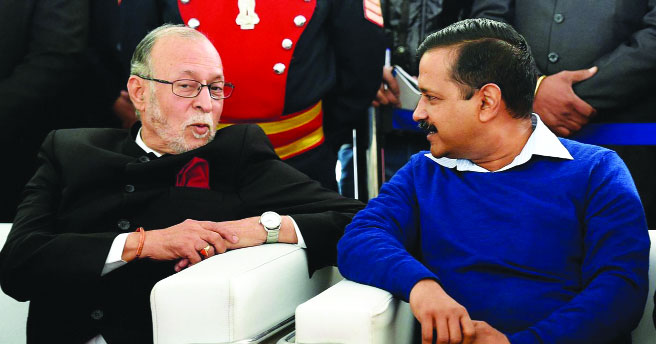Nullifying the Delhi govt order on appointing independent lawyers for riots cases seems to be aimed at influencing courts
If the Delhi Police, being an elite law-keeping force in the country, is so sure about the impartiality and professionalism of its conduct during the city riots in February, why does it want its own public prosecutors to fight related cases in court? Or why is the Lt Governor, Anil Baijal, as the Centre’s representative, locking horns yet again with the Aam Aadmi Party (AAP)-led Delhi Government on an issue of propriety? This time Baijal has overturned the Delhi Cabinet’s decision that had disbanded the panel of lawyers suggested by the Delhi Police from arguing in the Supreme Court and the High Court in the interest of a fair probe. Not only this, he has invoked Article 239AA(4) of the Constitution and referred the dispute to the President. Under the said Article, the Delhi Government is bound to follow the L-G’s orders. The AAP Government, which has time and again insisted that the Delhi Police is not under its purview and did not oppose it or the Home Ministry to which it reports despite public criticism during the riots, rightly exercised its prerogative to suggest a transparent analysis of events. It argued that since the courts had already raised serious questions on the investigations done by the Delhi Police in the riots case and during students’ protests, the lawyers shouldn’t be pro-Government. So against the Delhi Police’s proposal to appoint six senior lawyers, including Solicitor General Tushar Mehta and ASG Aman Lekhi, as special counsel in the High Court and Supreme Court in 85 cases related to the riots and the anti-Citizenship (Amendment) Act protests, the Delhi Government wanted to field lawyer Rahul Mehra and his team. Does this mean that the Centre is trying to dictate the course of the trial, investigation and public perception? Or is it trying to justify the crackdown on the protesters and label them as seditious? For under no circumstance should the prosecution be linked to one of the parties that is under investigation. Of course, the BJP has launched a counter-charge, saying the AAP was trying to save its MLA Tahir Hussein, who has been booked for instigating the riots. But there have been far too much evidence and reports that show how instead of pursuing the rioters, the Delhi Police has been harassing victims, activists and acting in a partisan manner. Meanwhile, politicians who incited mobs were neither charged nor arrested. One cannot ignore the judiciary either, which has called out the non-action or the programmed action of the police. Earlier, none other than the Supreme Court had observed that the riots in Delhi could have been prevented if the police had the independence to act. The Bench used strong words: “Unfortunate things have happened, the problem is the total lack of independence of the police.” And on Friday, the Delhi High Court asked Special Commissioner of Police Praveer Ranjan to explain the “necessity” of issuing a letter to chiefs of probe teams, which said that arrests of “some Hindu youth” from riot-hit areas had led to a “degree of resentment among the Hindu community.” Justice Suresh Kumar Kait also asked him to place before the High Court “five such letters” issued by him or his predecessor as the CrPC does not mandate such instructions and reminded that senior officers can just guide their teams but not influence the facts.
The February riots were the worst that Delhi has seen since the targetted killing of Sikhs in 1984. It brought out a rabid kind of communal sentiments and embarrassingly happened when US President Donald Trump was on his first visit to India, thereby drawing international attention. But then COVID-19 happened and steamrolled all such concerns. Yet, given the sensitivity involved and the excesses of brutality, it is of utmost importance that the rule of law is upheld and the judiciary allowed to function independently. Already perceived to be acting under executive pressure, ever since the Narendra Modi Government came to power and emaciated institutional powers, the judiciary should not appear to be “guided” in the riots case. Anyway, the line between fact and fiction has blurred with too many ground truths held back from the public domain. And disproportionately, the Government narrative of stereotyping the riots as another volatile expression of communal angst has been gaining ground. The Delhi Police is capable of conducting a sound probe but appears to be under pressure to “manage” a certain narrative so that courts have very little to deliberate on. Certainly, nothing could be a bigger travesty of justice. And if the Delhi Police looks toothless, one would dread to imagine what happens in the State police forces of Uttar Pradesh and Haryana, where the ruling party sentiment will sit in judgment on the right to protest.


























